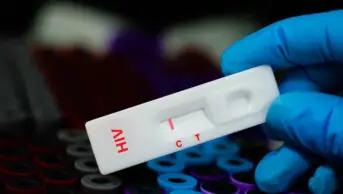
Shutterstock.com
Pharmacy staff are being asked how community pharmacies could provide HIV pre-exposure prophylaxis (PrEP) as part of research commissioned by the National Institute for Health and Care Research (NIHR).
The work, which is being carried out by University of Bristol, is intended to identify barriers that community pharmacies will need to overcome if they are to provide PrEP.
The ‘Accessing PrEP through pharmacies to improve HIV prevention‘ research project, which is also looking at the training pharmacy staff may need to provide the service, began with a scoping review of existing evidence, which was published as a preprint on 6 October 2023.
“We found that barriers to PrEP delivery for pharmacists included lack of knowledge, training and skills in relation to HIV testing and PrEP delivery, and not having the necessary facilities to conduct the tests and consultations,” Jeremy Horwood, professor of social sciences and applied health research at the Centre for Academic Primary Care, Bristol Medical School, and project lead at the NIHR Applied Research Collaboration West, told The Pharmaceutical Journal.
Other barriers to pharmacy delivery of PrEP included concerns about the cost of PrEP and a belief that its use could lead to increased sexually transmitted infections. However, Horwood said issues that could support pharmacy PrEP delivery included “effective staff training and the right facilities, [pharmacists] believing PrEP could be a source of income and could reduce new HIV infections in their local population”.
Following the scoping review, researchers have begun a series of interviews with pharmacy staff across Bristol, north Somerset, and south Gloucestershire, to “understand facilitators and barriers to pharmacy PrEP delivery”.
In evidence submitted to the House of Commons Health and Social Care Committee pharmacy inquiry, which was published on 18 October 2023, the Terence Higgins Trust, a sexual health charity, told MPs that PrEP provided via community pharmacies was a “preferable route” for groups less likely to access PrEP through sexual health services.
It added that while sexual health services should remain a route to accessing PrEP, widening access to pharmacies “would alleviate pressure and expand access, especially in towns and rural areas, where pharmacies are often more accessible than sexual health services”. The charity went on to describe the use of pharmacies as “vital in tackling health inequalities, expanding PrEP access and ending new cases of HIV by 2030”.
PrEP has been routinely available in specialist sexual health services since 2020, but in its HIV action plan, published in 2021, the government committed to developing “a plan for provision of PrEP in settings beyond sexual and reproductive health services”.
According to documents seen by The Pharmaceutical Journal earlier in 2023, the PrEP access and equity task and finish group — established by the Department of Health and Social Care in October 2022 to identify ways of improving access to PrEP — made several recommendations to improve access to PrEP and reduce HIV transmission in England.
One recommendation was that “national health bodies, in partnership with local commissioners, should commission a series of pilots providing PrEP in a variety of settings outside specialist sexual health clinics, including online, pharmacies, GPs, a community setting, a contraceptive clinic and a non-specialist sexual health setting”.
In a Westminster Hall debate, held in September 2023, health minister Neil O’Brien said the government’s HIV action plan implementation steering group, was “working to develop a PrEP roadmap”.
O’Brien told MPs that the roadmap would be out before the end of 2023 and that “it will deal with how we will work through all the knotty issues in enabling community pharmacy to provide PrEP”.


